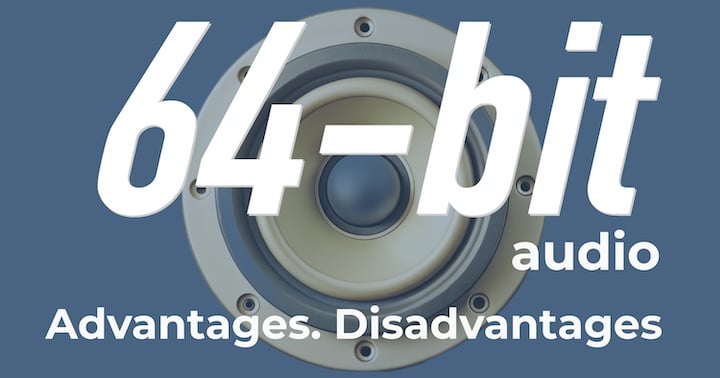
If you buy "AuI ConverteR PROduce-RD" (2023/12.x version) from 24 August 2023 to 24 October 2023, you will get free update to version 2024 (13.x) after its release.
Remark: AuI ConverteR 48x44 uses 64-bit floating point audio processing for all versions.

Back to top
How to convert 64-bit audio
To convert 64-bit audio:
- Launch audio conversion software [AuI ConverteR]
- In the main window, click on Open files button and select input files with 64-bit resolution (in instance, .wav).*
Note: RF64/BFW refers to file size. 64-bit resolution is supported by any .wav-file type.
- In the Directory output files field, select output directory.
- In AuI ConverteR's main window (right middle), Format field, select target PCM-audio file format: WAV, FLAC, AIFF, mp3, m4a, etc.
- Select bit depth and sample rate of converted files.
- Push Start button.
- Wait until the end ot conversion. Converted files are located in the directory that selected in goal 3.
* WARNING:
DVD-audio/video, Blu-Ray, DVD/BluRay/CD ISO are NOT supported.
For Modula-R version, SACD ISO, DSF, DFF are supported in proper configurations.
For ISO tracks, DSF, DFF longer than 3 minutes, FREE edition mutes 2-second silence in the output middle and has other restrictions. In batch conversion FREE version mutes 2 seconds in the output middle for second and the subsequent files.
Free version has processing sound quality identical commercial editions.
16-bit integer processing
Advantages
1. Fast mathematics.
2. Low-occupied hard disk and space of random access memory (RAM).
Disadvantages
1. High noise level (about -110 ... -120 dB)
2. Low number summarize/multiply steps for achieving overflow.
3. Is not bit width optimal for performance of 32- and 64-bit central processor units (CPU) of computers.
Back to top24-bit integer processing
Advantages
1. Low noise level (about -150 ... -160 dB)
Disadvantages
1. Is not suitable bit size for 32- and 64-bit CPUs.
Back to top32-bit integer processing
Advantages
1. Very low noise level (about -170 ... -190 dB)
2. Fast mathematics.
3. Fastest access to RAM (for 32- and 64-bit CPUs).
3. Is optimal bit size for 32- and 64-bit processors of computers.
Disadvantages
1. Restricted number summarize/multiply steps for achieving overflow.
Back to top32-bit floating point processing
Advantages
1. Fast mathematics (for math co-processors).
2. Fastest access to RAM (for 32- and 64-bit CPUs).
3. Very low noise level (below -190 dB)
Disadvantages
1. Restricted number summarize/multiply steps for achieving overflow, but more than integer.
Back to top64-bit integer processing
Advantages
1. Very low noise level (below -190 dB)
3. Fastest access to RAM (for 64-bit CPUs). Optimal bit size for 32- and 64-bit processors of computers.
Disadvantages
1. Restricted number summarize/multiply steps for achieving overflow (then for floating point resolutions).
2. More significant accumulated rounding errors (than for floating point resolutions).
Back to top64-bit floating point processing
Advantages
1. Almost not restricted number summarize/multiply steps for achieving overflow (then for floating point resolutions).
2. Very low noise level (below -190 dB)
3. Fastest access to RAM (for 64-bit CPUs). Optimal bit size for 32- and 64-bit processors of computers.
Disadvantages
1. Most slow calculation performance.
Back to topFrequently Asked Questions
Is there 64bit audio?
Yes. There are 2 types of 64-bit resolution: integer and float point.
This resolution is used for pro-audio applications prinmarily.
This format allows saving and processing of a sound stream.
Read more...
What is 64 bit audio processing?
64-bit audio processing is an audio processing that uses 64-bit computer variables. These variables may be 2 types: integer and float point.
Read more...
Back to top
Read more
- What is Jitter in Audio. Sound Quality Issues >
- How to Choose the Best Audio Converter Software >
- What Is Ringing Audio >
- What is dithering audio? >
- Bit-Depth Audio and Harmonic Distortions >
- Audio as Optics >
- What is optimization audio for DAC >
- Where is the Limit of Audio Quality? >
- Power Conditioner for Audio. It's real advantage? >
Audio Basis - articles about audio